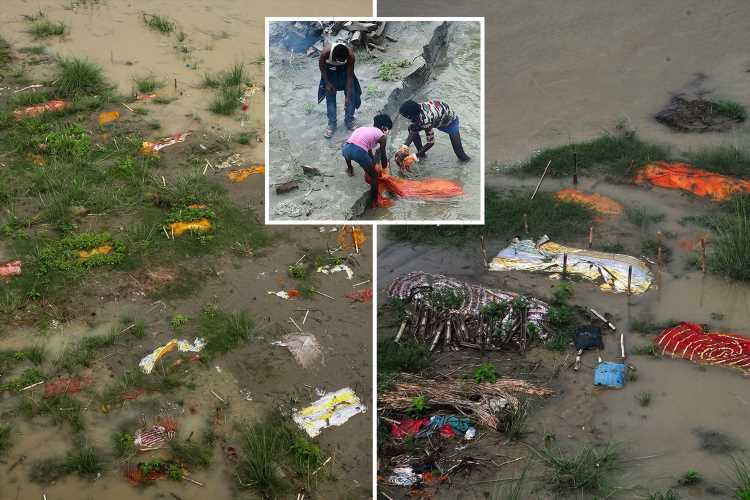HUNDREDS of Covid "zombie" corpses are turning up along the river Ganges as monsoons threaten to unearth thousands more.
Bodies shrouded in saffron cloth are being spotted all along the ancient river in what is a damning reminder that crematoriums and hospitals in India are still struggling to cope with the impact of Covid-19.
🔵 Read our coronavirus live blog for the latest updates
Families in the country's north and east have given loved ones' bodies to the river or buried them in shallow graves on its banks because of the soaring prices of pyres – the burning of a corpse upon wood and set on fire.
The start of seasonal monsoon flooding has caused strong currents to surge through the 1,550-mile long waterway, dislodging some of the bodies buried on its banks.
India is experiencing one of the worst outbreaks in the world.
Last month, corpses were filmed piling up at the banks of the waterway at Chausa town in the northern state of Bihar.
Officials say the bodies floated down from Uttar and belong to Covid patients whose families may have been unable to cremate or bury them
This came as India reported 370,000 new infections and more than 3,700 new deaths in one day.
The devastating wave has overwhelmed the country's healthcare system and experts have said official figures for cases and fatalities are much lower than the actual numbers.
Officials in Allahabad — one of Hinduism's holiest cities, where millions visit to perform funeral rites — say almost 150 bodies that floated up in the past three weeks have been cremated.
Funeral pyres line the riverside beside piles of wood waiting for new bodies to be retrieved.
Up to 600 bodies were buried along the Ganges during the virus surge, officials say.
But locals believe that is a fraction of the real number and fear that more could be dislodged from the sandy banks by rapid waters in the coming weeks.
Sonu Chandel, a boatman who works in a riverside crematorium, was shaken by the sight of families burying their dead two months ago.
He said a sense of uneasiness returned to him as the waters began to rise due to a monsoon surge.
"It was really sad to see poor people burying their loved ones in an undignified manner, but the rising water level has made it worse," Chandel told AFP.
"There is always the fear of (a body) hitting the oar or running over a dead body as the water level goes up."
Other major religious centres in northern India are also experiencing similar nightmare scenarios.
During the peak in April, millions of Hindus gathered in the Himalayan town of Haridwar to attend the Kumbh Mela festival.
Officials said more than 2,000 people who attended had tested positive for the virus, including dozens of religious leaders, since travelling to other parts of the vast country.
Epidemiologist Dr Lalit Kant said: "It's disastrous. And these numbers are only the tip of the iceberg.
"The groups of pilgrims travelling in crowded trains and buses would have the multiplier effect on the number of infections."
Locals fear the corpses, if not removed, risk contaminating what is already one of the world's most polluted waterways.
"This… could cause dangerous diseases," Dipin Kumar, who lives near the Ganges in Allahabad, told AFP.
"The government must think this over and only they can make a plan."
It's disastrous. And these numbers are only the tip of the iceberg.
The holiest river in India, the "Mother Ganga" like other water bodies in India is worshipped as a goddess by Hindus and viewed as the giver and taker of life.
Pilgrims flock to the Ganges to ritualistically bathe, and even before the pandemic, millions of Hindus cremated their dead along its banks before scattering the ashes in the river.
Those who couldn't afford to buy wood would submerge the bodies of their loved ones instead, while others conducted water burials as part of their religious traditions.
The number of corpses in and around the Ganges sharply increased during India's latest, record-breaking coronavirus surge.
Locals said funerals – which can cost more than 7,000 rupees (£68) – were adding to the hardships of those already struggling to make ends meet in the pandemic-stricken economy.
Police and state disaster teams now patrol the river looking for bodies.
Officials have stationed two boats along the banks to retrieve the corpses — sometimes with help from local fishermen — but have had little success in recent days.
"The flow is very fast and it is a challenge to fish out bodies now," a police officer told AFP.
As of June 21, nearly 30million people have been struck down with Covid in Indian and 388,000 have died.
Source: Read Full Article















